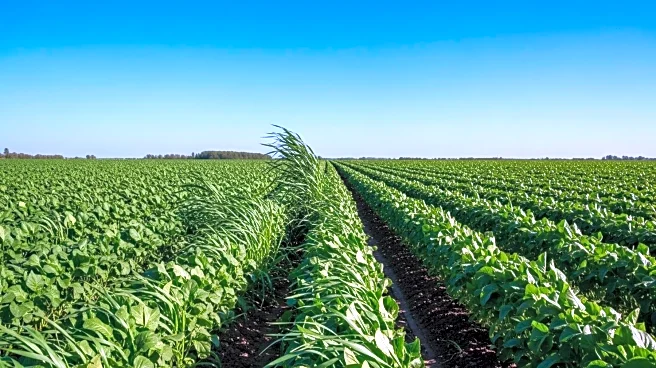What's Happening?
The global organic farming market is experiencing substantial growth, with projections indicating an increase from $7.05 billion in 2024 to $22.7 billion by 2032. This growth is driven by changing consumer preferences, government initiatives, and the rising importance of sustainable agriculture. Organic farming emphasizes the use of natural inputs and sustainable cycles, avoiding synthetic fertilizers, pesticides, and genetically modified organisms (GMOs). The market's expansion is supported by increased consumer awareness of health and environmental concerns, leading to a shift away from conventional farming methods. Government policies play a crucial role in this growth, with subsidies, grants, and tax credits encouraging farmers to adopt organic practices. Certification systems, such as the USDA Organic and EU Organic logos, enhance consumer trust by assuring product authenticity.
Why It's Important?
The growth of the organic farming market has significant implications for various stakeholders, including consumers, farmers, and policymakers. For consumers, the shift towards organic products reflects a growing concern for health and environmental sustainability. Organic foods are perceived as healthier and safer, free from synthetic chemicals and GMOs. This trend is particularly strong among millennials and Gen Z, who prioritize sustainability and ethical consumption. For farmers, the transition to organic farming offers opportunities for increased profitability and market access, supported by government incentives and consumer demand. Policymakers benefit from promoting organic farming as it aligns with broader environmental goals, such as reducing pollution and preserving biodiversity. The market's growth also encourages innovation in agricultural practices, integrating biological solutions with precision agriculture technologies.
What's Next?
The organic farming market is expected to continue its growth trajectory, with Europe leading the way due to strong consumer demand and supportive government frameworks. The Asia-Pacific region is anticipated to witness the fastest growth, driven by population increases and rising food demand. In the U.S., the organic market remains one of the largest globally, with continued expansion likely. As the market grows, companies involved in organic farming are investing in research and product innovations to meet the increasing demand. The future of organic farming will be shaped by consumer preferences for clean-label foods, sustainability-focused regulations, and technological advancements in agricultural practices.
Beyond the Headlines
The rise of organic farming reflects broader cultural and ethical shifts towards sustainability and environmental responsibility. As consumers become more aware of the impact of their food choices, the demand for organic products is likely to influence other sectors, such as packaging and distribution, to adopt more sustainable practices. The integration of technology in organic farming, such as precision agriculture, highlights the potential for traditional practices to evolve and become more efficient. This trend underscores the importance of balancing innovation with ecological preservation, ensuring that agricultural advancements contribute positively to the environment.









